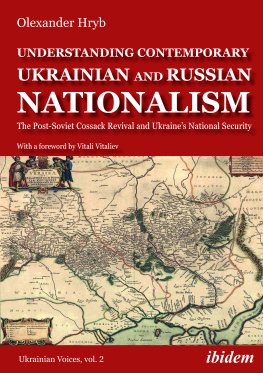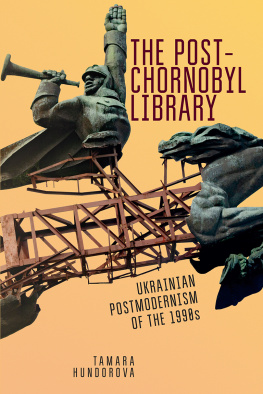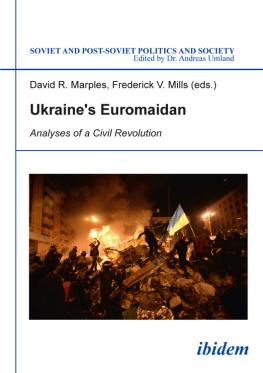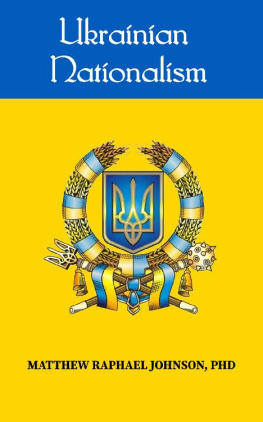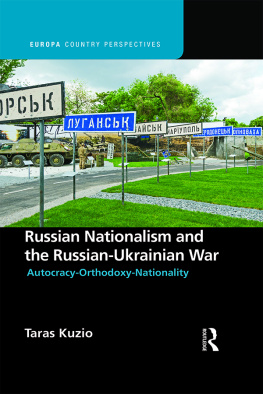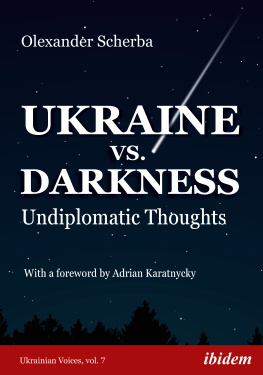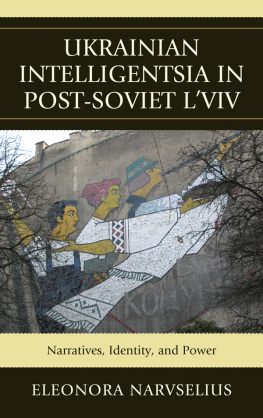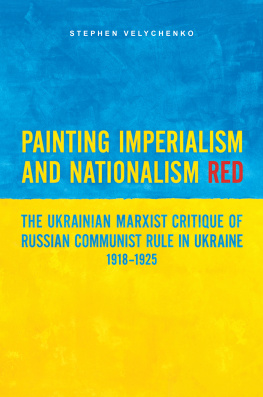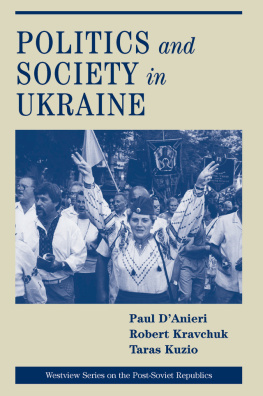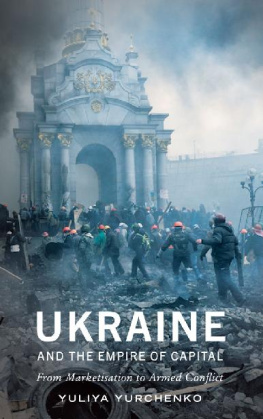ibidem -Press, Stuttgart
Doctrina Fortior Armis
How to read this book
Nationalism, national identity and ethnicity are such complex social phenomena that academic researchers worldwide are divided in even defining these terms. Therefore the first two chapters are dedicated to definitions, so that readers will have a clear understanding of the relevant theoretical framework before Ukrainian and Russian nationalisms are discussed. Considering that a lot of the content in such discussions is of mostly academic value, readers interested in the actual nationalist narratives can go straight to chapter 4 and 5 and the case studies on Russia and Ukraine. Professionals who are interested in the security implications of paramilitary movements with a nationalist ideology (i.e., Cossacks) as well as potential conflict resolution can skip straight to Chapter 5. Social scientists interested in the actual fieldwork methodology, data collection and findings might want to start reading from the Appendixes 1 & 2.
PREFACE
The sources from which information for this monograph has been taken are published works, official documents, lectures and interviews. The conceptual idea of research evolved as a result of my studies beginning at the Graduate School for Social Research (Institute of Philosophy and Sociology, Polish Academy of Science) in 1994-1996 where I greatly benefited from the supervision of professors Janusz Reykowski and Henric Domanski as well as from the seminars of Joanna Kurczewska and Erica Benner. I also participated in the seminars at the University of Warsaw given by Professor Ernest Gellner and gratefully remember his comments on the initial research outline of my PhD thesis. I have also to thank Claire Wallace (Central European University, Prague) and Birgit Muller (Marc Bloch Centre for Social-Anthropological Research, Berlin) for their help in starting up my fieldwork research among the Cossack Communities in Southern Ukraine in 1995.
During the summer of 1995 the first fieldwork findings were researched together with Austrian sociologist Sabine Haas to whom I am especially indebted for her thoughtful insights, which are reflected in my fieldwork analysis. The fieldwork proceedings at a later stage in 1996-1997 would have been impossible without a grant from the GSSR, so my gratitude is addressed to the Head of the School, Professor Stefan Amsterdamski. I would like also to thank Ukrainian scholars: Professor Natalia Chernysh (University of Lviv), Dr. Olena Bachynska and Dr. Anatoliy Mysechko (University of Odesa), Dr. Olga Philipova (University of Kharkiv) and Dr. Taras Chuhlib (Center for Research of Cossack History, Institute of History, Ukrainian National Academy of Science). Finally, my work could not have been completed without the assistance of many others, whom I also thank wholeheartedly.
Understanding Contemporary Ukrainian and Russian Nationalism
The Post-Soviet Cossack Revival and Ukraines National Security
SUMMARY
This monograph explores the causes and conditions of nationalist revivals as such and in post-Soviet Ukraine and Russia specifically. It does so by, first, developing a framework based on a synthesis of Eastern and Western European perspectives on nationalism; and, then, applying this framework to the case of the Cossack nationalist revivals in Russia and Ukraine.
In order to develop a framework for analyzing nationalist revivals, the monograph explores Eastern (Russian and Ukrainian), as well as Western, theoretical perspectives relating to national identity, national and ethnic communities, and nationalist movements. Soviet ethnography and Soviet ethnic engineering continue to influence both academic discourse and state policies in the Russian Federation and Ukraine with respect to post-communist nation building. Understanding Soviet and post-Soviet theoretical perspectives on nationalism can contribute much to the study of nationalist phenomena, in the West as well as in the East. Thus, the monograph not only introduces into the English-language literature often overlooked Russian and Ukrainian (Soviet and post-Soviet) theories, but also suggests how these theories might be synthesized with Western traditions to produce a better framework for understanding nationalism. To this end, this monograph proposes a synthetic framework based on an analysis of commonalities and divergences in the Western and Eastern traditions.
Central to this framework is the concept of societal or identity security. The monograph endeavors to show the importance of societal security to an understanding of when and why nationalist movements turn violent by applying it to the case of the Cossack nationalist revival in Russia and Ukraine. Research on Cossack nationalism not only demonstrates the utility of the proposed framework and its central concept (societal security); it also clarifies the distinction commonly drawn between ethnic and civic nations. In doing this, it provides insight, not only into nation building in the former Soviet Union, but also into the origins and evolution of Eastern vs. Western nations.
Contents
ABBREVIATIONS
ASSRAutonomous Soviet Socialist Republic
BBCBritish Broadcasting Corporation
CISCommonwealth of Independent States
CPSUCommunist Party of the Soviet Union
ESOEthno-Social Organism
EUEuropean Union
EAEUEurasian Economic Union
FSUFormer Soviet Union
GMTGreenwich Mean Time
IMFInternational Monetary Fund
IRInternational Relations
ITARTASSRussian Information Agency
KGBSoviet Security Service
KLAKosovo Liberation Army
MODMinistry of Defense
MPMember of Parliament
MVDMinistry of Interior in the USSR or the Russian Federation
NATONorth Atlantic Treaty Organization
NCANational Cultural Autonomy
NEONew European Order
NISNewly Independent States
NTVRussian National Television
NUASNational Ukrainian Academy of Science
OSCEOrganization of Security and Cooperation in Europe
RSKRepublic of Serbian Krajina
RSFSRRussian Soviet Federative Socialist Republic
SBUUkrainian Security Service
SWBShort Wave Broadcast reports by the BBC Monitoring
UAFUkrainian Armed Forces
UKUkrainian Cossack Organization
UKUnited Kingdom
UNIARUkrainian Independent News Agency Respublika
UPAUkrainian Resurgence Army
USAUnited States of America
USSRUnion of Soviet Socialist Republics
VDVSoviet and then Russian or Ukrainian paratroopers military formations
WW2Second World War
Foreword
Strangers to Themselves
By Vitali Vitaliev
Olexander Hryb has written an extremely topical book, the main subject of which is national identity.
Lets face it: nationalismin all its different guises and manifestationsremains one of the main divisive factors on the global, read federal, scale and, at the same time, one of the main uniting ideologies on the local, read provincial, level. Theres no need to give examplessuffice it is to open a daily newspaper, turn on radio or TV, or do a quick browse of the Internetand you will be showered with them.
But what exactly is nationalism, often wrongly confused with hooray patriotism of the type which Dr. Samuel Johnson famously (and rather categorically) branded the last refuge of a scoundrel? My online dictionary defines it (nationalism) as identification with one's own nation and support for its interests, especially to the exclusion or detriment of the interests of other nations. If so, then nationalism and national (or cultural) identity are very close relations, and one cannot exist without the other. In the words of the former US President Bill Clinton, If you dont remember anything else I say, remember this: every single fundamental problem of the independent world is rooted in an imperfect sense of identity. And in a stubborn and often violent search for it, I would add.

